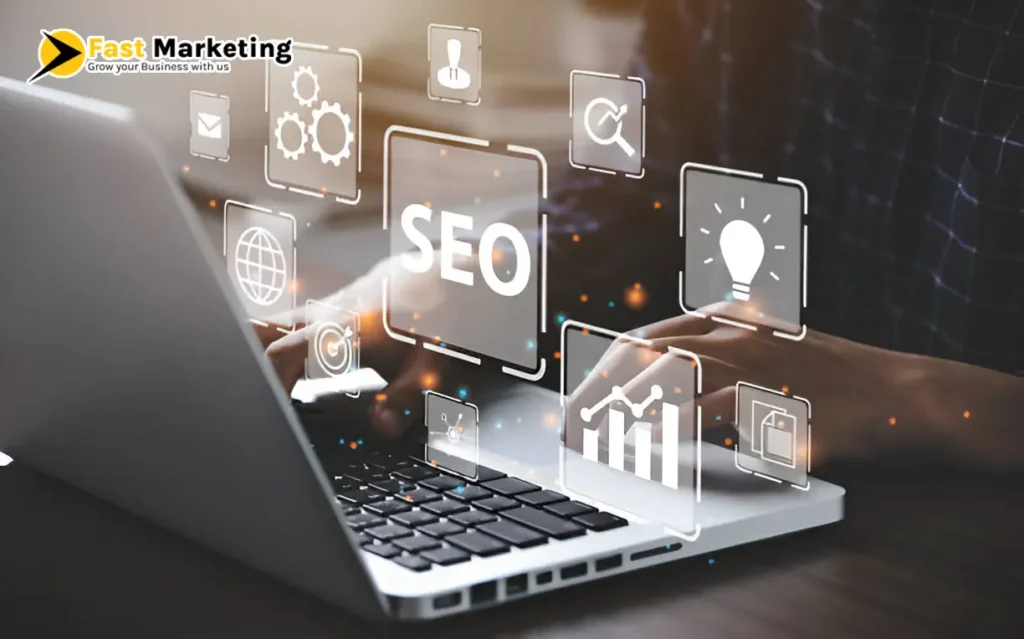What is on Page SEO in Digital marketing, in all its forms, relies on successful on-page SEO in reaching the top and bringing in as much traffic as possible while delivering user-friendly experiences. On-page SEO is the technique of optimizing separate pages to get more relevant search engine traffic and higher rankings. It is, on the other hand, different from off-page SEO, which primarily depends on what is happening externally, such as the number of backlinks one is receiving. With that said, let’s move into the makeup, advantages, and tactics defining on-page SEO.
Table of Contents
What is on Page SEO in Digital Marketing
On-page SEO is a digital marketing practice that is applied to optimize individual web pages so that they can achieve specific rankings in search engines and attract more organic traffic. In on-page SEO, the internal components of the website, which include content, meta tags, headings, images, URLs, and internal links, are optimized. It depends on keyword research and strategic placement so that the content is relevant and valuable for those to whom it is targeted. Other critical factors are improving website speed, mobile-friendliness, and user experience. On-page SEO helps the search engines to understand the context and relevance of the page and is an integral part of any successful digital marketing strategy.
Understanding On-Page SEO
On-page SEO basically means optimizing not only the content but also the HTML source code on a page so that search engines understand the content and relevance while delivering a flawless user experience. It is more than pleasing the algorithms; it is about the value created for readers.
Key elements of on-page SEO are keyword optimization, meta tags, internal linking, image alt attributes, and quality content. All these elements help convey to the search engines what your page is all about.

Why is On-Page SEO Important ?
Improves Search Engine Rankings
What is on Page SEO in Digital Marketing ? A very useful page signals to the search engines that the content found in your website is relevant and authoritative. This increases the chances of appearing within top search results for targeted keywords.
Enhances User Experience
On-page SEO targets fast-loading pages, mobile-friendliness, and engaging content, all contributing to a better user experience.
On-page SEO targets fast-loading pages, mobile-friendliness, and engaging content, all contributing to a better user experience.
Organic Traffic
You will attract specifically those who are going to search for the services or information you provide with appropriate on-page SEO.
Essential Fundamental of On-Page SEO
The foundational principles of on-page SEO comprise keyword optimization in meta titles, descriptions, headers, and content; ensuring mobile-friendliness; improving site speed; and proper linking within the website. Good-quality, user-centric content, along with optimized images, contribute significantly to ranking improvement.
Keyword Research and Optimization
The basics of on-page SEO comprise optimizing meta titles, descriptions, headers, and content with keywords, ensuring it is mobile-friendly, improving speed, and doing internal linking. High-quality content that is user-oriented and proper optimization of images is also important factors in ranking well in digital marketing
Keyword Placement : Use the target keywords in the title tag, meta description, headers, and throughout the natural body content.
LSI Keywords: Use Latent Semantic Indexing (LSI) keywords to expand the contextual relevance of your content.
Title Tags and Meta Descriptions
Title tags and meta descriptions are the first thing users see in the search results. Make sure that they are enticing, keyword-heavy, and as short as possible.

Title Tag: Use your main keywords and keep it to 60 characters.
Meta Description: In 160 characters, give a concise, interesting synopsis.
3. High-Quality Content
The backbone of on-page SEO is creating valuable content. Search engines reward relevant, informative, and engaging content.
Originality: Avoid duplicate content for credibility.
Content-Length: This should be full content of more than 1,000 words where applicable.
Readability: Use simple language, bullet points, and subheadings for user experience in digital marketing
3. Header Tags (H1, H2, H3)
What is on Page SEO in Digital Marketing in Header Tags
Header tags organize your content for easy readability and navigation.
H1 Tag: Use just one H1 tag, which is your main keyword.
Subheadings: Use the H2 tag and H3 tags for the other keywords to break it up a little.
4. Image Optimization
What is on Page SEO in Digital Marketing Images in enhance content but require optimization to avoid slowing down your page.
File Names: Ensure descriptive file names with your keywords.
Alt Text: Give alt attributes to improve accessibility and also include some relevant keyword information.
Compression: Reduce file size to improve load times.
File Names: Describe the names of the files using keywords.
5. Internal Linking
Link to related pages within your site. Such linkage enhances navigation and distributes the authority.
Anchor Text: Always use descriptive anchor text containing relevant keywords.
Link Depth: Make sure that important pages are not hidden deep in your site hierarchy.
4. Mobile-Friendliness
With the majority of users browsing on mobile devices, a responsive design is non-negotiable. With Google’s adoption of mobile-first indexing, this makes it that much more important.
Responsive Design: Alter the structure of your website to fit all the screen sizes.
Touch-Friendly Elements: Ensure that links and buttons are easy to tap.
9. URL Structure
URLs that are clear and informative improve user trust and SEO.
Short URLs: Ensure that your URLs are clear and keyword-packed.
Avoid special characters: replace hyphens with underscores.
Conclusion
In digital marketing, on-page SEO plays a very significant role in making a website visible. Optimization of elements like content, keywords, and meta tags helps the search engine understand your site’s relevance to the user. Thus, effective on-page SEO ensures better user experience and higher rankings. As it is a basic aspect of digital marketing, on-page SEO must be mastered to ensure long-term online success.





